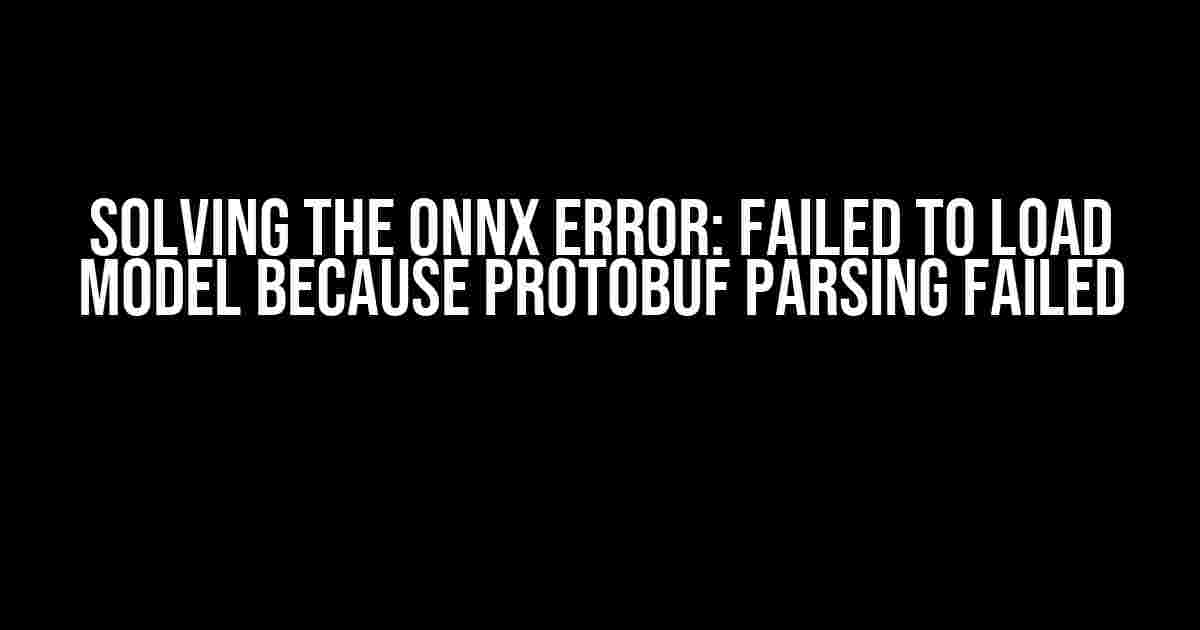If you’re working with ONNX models, you’ve probably encountered the frustrating error “Failed to load model because protobuf parsing failed”. This error can be a roadblock in your machine learning project, but don’t worry, we’ve got you covered! In this comprehensive guide, we’ll take you through the common causes of this error, troubleshoot the issues, and provide step-by-step solutions to get your model up and running.
What is Protobuf and How Does it Relate to ONNX?
Protobuf, short for Protocol Buffers, is a data serialization format developed by Google. In the context of ONNX, protobuf is used to serialize and deserialize the model’s architecture and weights. ONNX models are essentially protobuf messages that contain the model’s definition, weights, and other metadata.
Why Does Protobuf Parsing Fail in ONNX?
There are several reasons why protobuf parsing might fail when loading an ONNX model. Here are some common causes:
- Invalid or corrupted model file
- Incompatible ONNX version
- Missing or incorrect dependencies
- Incorrect model architecture or weights
- Protobuf version mismatch
Troubleshooting Steps
Before we dive into the solutions, let’s go through some troubleshooting steps to help you identify the root cause of the issue.
- Check the ONNX model file:
- Verify that the model file exists and is not empty
- Check the file extension (it should be .onnx)
- Open the model file in a text editor to ensure it’s not corrupted
- Verify the ONNX version:
- Check the ONNX version used to create the model
- Ensure that the version is compatible with your runtime environment
- Check dependencies:
- Verify that all required dependencies are installed
- Check the versions of dependencies to ensure compatibility
Solutions to Protobuf Parsing Failed Error
Now that we’ve identified the possible causes, let’s move on to the solutions!
Solution 1: Update ONNX Version
If you’re using an outdated ONNX version, update to the latest version using pip:
pip install --upgrade onnxSolution 2: Check and Fix Model File
If the model file is corrupted or invalid, try re-exporting the model from the original framework or re-downloading the model file.
Solution 3: Install Missing Dependencies
Install missing dependencies using pip:
pip install protobuf numpyMake sure to install the correct versions of dependencies to ensure compatibility.
Solution 4: Use the Correct Protobuf Version
If you’re using a custom protobuf compiler, ensure it’s compatible with the ONNX version. You can check the protobuf version used by ONNX:
import onnx
print(onnx.__version__)Then, use the compatible protobuf compiler or update the protobuf version:
pip install --upgrade protobufSolution 5: Load the Model Manually
If all else fails, try loading the model manually using the ONNX Python API:
import onnx
# Load the model
model = onnx.load('model.onnx')
# Check the model architecture
print(model.graph)This can help you identify any issues with the model architecture or weights.
Common Scenarios and Solutions
In this section, we’ll cover some common scenarios where the protobuf parsing failed error occurs and provide solutions.
| Scenario | Solution |
|---|---|
| Exporting a PyTorch model to ONNX |
|
| Using an older version of ONNX |
|
| Model file is too large |
|
Conclusion
In this article, we’ve covered the common causes of the “Failed to load model because protobuf parsing failed” error in ONNX and provided step-by-step solutions to troubleshoot and fix the issue. By following these guidelines, you should be able to identify and resolve the root cause of the error and get your ONNX model up and running.
Remember to stay calm, be patient, and carefully go through the troubleshooting steps to ensure a successful resolution.
Happy model loading!
Frequently Asked Questions
Struggling with the “Failed to load model because protobuf parsing failed” error in ONNX? Worry not, friend! We’ve got you covered. Check out these FAQs to troubleshoot the issue and get back to model rocking!
Q: What causes the “Failed to load model because protobuf parsing failed” error in ONNX?
A: This error typically occurs when the ONNX model is corrupted or invalid, causing the protobuf parser to fail. This can happen due to issues with model serialization, version compatibility, or even a mistaken file type.
Q: How can I verify the integrity of my ONNX model file?
A: To check your model file’s integrity, try loading it using the ONNX Checker tool (onnx.checker.check_model) or the ONNX Runtime (onnxruntime.InferenceSession). If the model is valid, these tools will successfully load it. Alternatively, you can use the onnx.load_model function to inspect the model’s graph structure.
Q: Can I fix the error by reinstalling the ONNX library?
A: Unfortunately, reinstalling the ONNX library won’t fix the issue. The problem lies with the model file itself, so you’ll need to focus on resolving the protobuf parsing failure rather than the library installation.
Q: What if I’m using an older version of ONNX? Could that be the culprit?
A: Yes, that’s a possibility! If you’re using an older version of ONNX, it might not be compatible with the model file. Try updating to the latest version of ONNX to see if that resolves the issue. Be sure to check the ONNX version compatibility with your model file as well.
Q: Are there any other common causes for this error that I should be aware of?
A: Yes, a few other potential causes include incorrect file encoding, missing dependencies, or even a typo in the model file path. Double-check these areas to ensure they’re correct and see if that resolves the issue.
